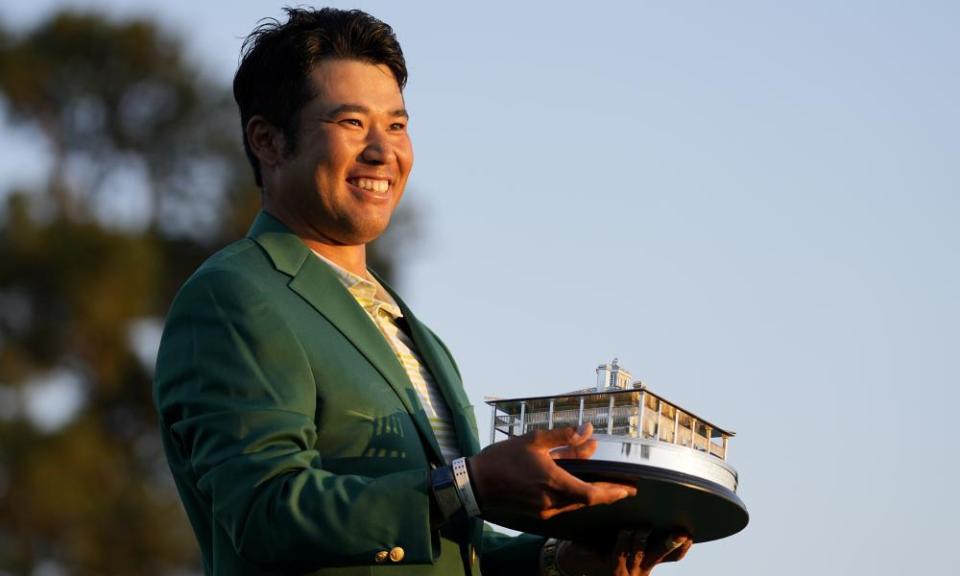Hideki Matsuyama is Japanese but his victory matters for Asian Americans

And with that, Hideki Matsuyama is the first male Japanese player ever to win a golf major.
Quite interesting timing, particularly as anti-Asian hate crimes in the US have risen 150% over the past year, spurred on by conspiracy theories – spread by those in power – about the origins of Covid-19. The hashtag ‘Stop Asian Hate’ surged more than 5,000% just this past month, according to Google Trends.
What does Matsuyama’s win have to do with America? At first, I contemplated this and thought: “nothing”. He is from Japan, with absolutely no ties to North America – outside of his Oakley sponsor. Many Asian Americans may feel more of a kinship with Tiger Woods than with Matsuyama, but then again, almost five other racial identities do as well.
Related: Hideki Matsuyama holds nerve to become Masters champion
Parallels can be drawn to when Yao Ming first arrived in 2002, or when Jeremy Lin rose to prominence during Linsanity in 2012. During Yao’s time in the NBA, most Asian Americans saw no commonality with a 7ft 6in giant from a country that might as well have been from another solar system culturally. I, for one, cheered on Shaquille O’Neal when Yao was matched up against him. Like many other Asian Americans, I felt more in touch with an underdog who had a somewhat similar origin of growing up in California than someone who was essentially groomed as a young child to become China’s national marvel. (Speaking to how out of touch America was just two decades ago, don’t forget that the Heat somehow thought it was a great PR move to pass out 8,000 fortune cookies to fans during Yao’s first game in Miami. Fortune cookies do not originate from China, and actually came from 19th century Japan.)
Some of us do ponder if Matsuyama’s win may actually encourage more animosity against Asians, specifically in the US. Much of golf’s American audience is white and conservative, from areas where there are few Asians. For some of them, seeing someone other than a white man in a green jacket may cause resentment – after all, it’s not like everyone was happy when Woods started his era of dominance among the country club set.
But we should put those worries aside. The first generation of Asian Americans came to this country to give a better life for the following generations. In order for all Americans to live in a country of compassion and acceptance, we must push forwards more minority-driven narratives. At the end of the day, it really does not matter if Matsuyama was raised American or western culturally. What really matters is seeing people of color doing great things. We need to get to the point where it is natural to see lead characters in films, or dominant athletes, coming from all backgrounds.
Related: ‘We’re not taught to speak out’: Asian Americans find their voice amid rise in hate
Over the course of the year, news outlets have started to turn more attention to hate crimes and racism against Asians. Many cable news channels have started to bring in Asian influencers and activists to continue the conversation. No doubt, this would have just been part of the news cycle, and the shows would soon have moved on to other ‘newsworthy’ subject matter.
Instead, came the domestic terrorism shootings in Georgia – the same state, incidentally, where Matsuyama won the Masters – which thrust the topic into the national spotlight, and a domino effect started.
The model minority stereotype has been thrust aside, at least momentarily, as Asian Americans from all walks of life have fought back publicly against racism. An Ohio politician named Lee Wong, sick of people questioning whether he is American, removed his shirt during a town meeting and showed a deep scar that he suffered while serving in the US Army and asked: “Is this patriot enough?” A 75-year-old Chinese woman, who was attacked in San Francisco and bravely fought off her assailant, donated all of the funds raised for her – just under $1m – back into the Asian-American community to fight racism.
As sad as it sounds, one has to wonder had this pandemic and the Georgia shootings not occurred, would the Asian American community continue to be ignored? What outsiders always seem to forget is that Asian Americans differ drastically in cultural terms – we are Chinese, Korean, Japanese, Burmese, Vietnamese … the list goes on. Yet the one thing that holds us all together is the same meaningless taunt of “Go back to China!” or “You don’t belong here”. The only thing we as a community can do collectively is continue to celebrate Asian success stories like Matsuyama’s, no matter how rarely they come – and even if they’re from someone we seem to have little in common with.

 Yahoo Finance
Yahoo Finance 